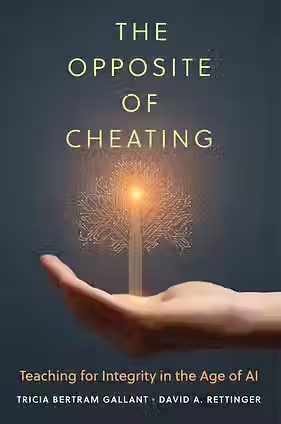ABOUT THE BOOK

What if we focused on supporting learning instead of stopping cheating?
In these days of an ever-expanding internet, generative AI, and term paper mills, students may find it too easy and tempting to cheat, and teachers may think they can’t keep up. What’s needed, and what Tricia Bertram Gallant and David A. Rettinger offer in this timely book, is a new approach—one that works with the realities of the twenty-first century, not just to protect academic integrity but also to maximize opportunities for students to learn.
The Opposite of Cheating presents a positive, forward-looking, research-backed vision for what classroom integrity can look like in the GenAI era, both in cyberspace and on campus. Accordingly, the book outlines workable measures teachers can use to better understand why students cheat and to prevent cheating while aiming to enhance learning and integrity.
Bertram Gallant and Rettinger provide practical suggestions to help faculty revise the conversation around integrity, refocus classes and students on learning, reconsider the structure and goals of assessment, and generally reframe our response to cheating. At the core of this strategy is a call for teachers, academic staff, institutional leaders, and administrators to rethink how we “show up” for students, and to reinforce and fully support quality teaching, learning, and assessment. With its evidentiary basis and its useful tips for instructors across disciplines, levels of experience, and modes of instruction, this book offers a much-needed chance to pause, rethink our purpose, and refocus on what matters—creating classes that center human interactions that foster the personal and professional growth of our students.
Table of Contents
Introduction
-
Why Students Cheat
-
Communicating Integrity
-
Designing Courses for Integrity
-
Designing Assignments for Integrity
-
Strategies that Promote Success with Integrity
-
Protecting Assessment Integrity
-
Infusing Ethics Into Teaching and Learning
Conclusion

Flower Darby
co-author of Small Teaching Online: Applying Learning Science in Online Classes
“Leading with empathy and nuance, Tricia Bertram Gallant and David Rettinger invite instructors to cultivate academic integrity in their students rather than focus solely on cheating. This book offers a rich and current evidence base, insights into teaching and learning in an AI world, motivating illustrations, and highly practical strategies for all classes, disciplines, and modalities.”
Greer Murphy
Director of the Academic Integrity Office, University of California, Santa Cruz
“Bertram Gallant and Rettinger’s clear-eyed, compassionate, no-nonsense approach to teaching with and for integrity presents a must-read for scholar-practitioners across the higher-education spectrum. Never preachy, always practical—this book raises the bar for how we talk about integrity in higher education.”
Susan D. Blum
author of My Word! Plagiarism and College Culture
“Ever mindful of contract cheating and AI, what is a college professor concerned about academic integrity to do in the twenty-first century? Bertram Gallant and Rettinger have ideas, lots of them. The book is filled with excellent ideas about course design and pedagogy in a range of disciplines. You will emerge from reading this book a better teacher, more confident and better able to prepare students for the lives they will be living.”